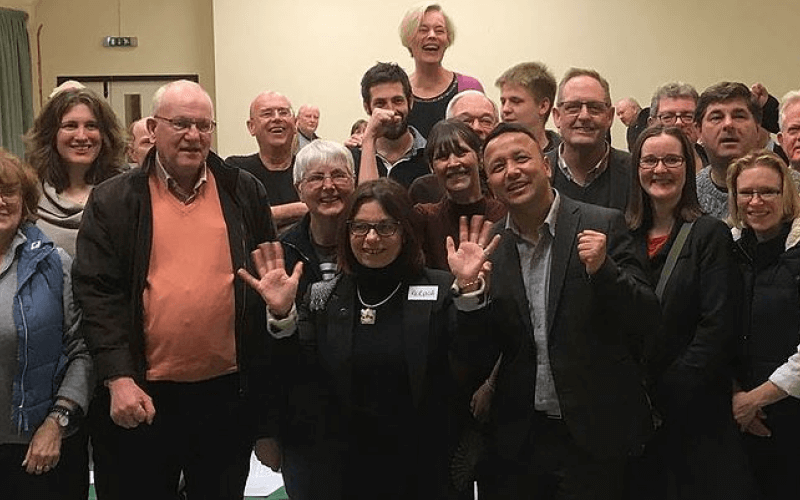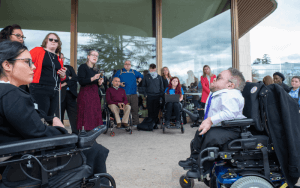The government has been accused of discriminating against disabled people standing at next month’s general election – and breaching the UN disability convention – by refusing to fund any of their disability-related campaign spending.
The refusal of the Government Equalities Office (GEO) to support disabled candidates at next month’s election means many of them will be forced to pay themselves for expenses such as interpreters, personal assistants, assistive technology and taxi fares.
GEO refused this week to confirm that candidates will not be able to claim support from its EnAble fund, which currently provides funding only to disabled people fighting local government and police and crime commissioner elections.
But Disability News Service (DNS) has seen an email from Disability Rights UK (DR UK), the disabled people’s organisation which administers the fund, which makes it clear that GEO will not extend EnAble.
The email was sent to Kerena Marchant (pictured, centre front), who is fighting the Basingstoke seat for Labour at next month’s election and is a Deaf user of British Sign Language (BSL).
She is having to meet most of the cost of the interpreters she will need throughout her campaign herself, with some support from her party. She said this will place her at a “substantial disadvantage”.
She said the government’s failure meant it was discriminating against disabled people under the Equality Act and breaching article 29 of the UN Convention on the Rights Of Persons with Disabilities (UNCRPD) on participation in political and public life.
She had urged DR UK “to do everything it can to end this substantial disadvantage we face as disabled candidates”.
But Marchant was told by DR UK that GEO had made it clear that it was “neither able to amend the current contract… nor implement a new one”.
This means she will not be able to use the EnAble fund to pay for her BSL interpreters during the general election campaign.
Marchant’s Conservative opponent at the election will be Maria Miller, the former minister for disabled people under the 2010 coalition.
This week, Miller, who is currently chair of the Commons women and equalities committee, failed to comment on the government’s refusal to extend the EnAble fund, and on whether she agreed with Marchant that that refusal was a breach of the Equality Act and UNCRPD.
Another BSL-user who will be standing at the election is Liberal Democrat David Buxton, who will be fighting the East Hampshire seat currently held by Tory Damian Hinds, the former education secretary.
Buxton is being forced to raise £7,500 himself from family and friends to pay for the interpreters he will need through the campaign, as his party will only be able to provide a small proportion of the funds he needs.
He was one of three disabled politicians who forced the government to set up the temporary EnAble fund after their lawyers warned that the failure to reopen a previous fund that had covered parliamentary elections breached the Equality Act.
He said he was “fuming” at the government’s position and felt “humiliated” by having to ask family and friends for their financial support.
Buxton pointed out that employees can claim funding through the government’s Access to Work scheme for many of their disability-related costs, but election candidates are not able to do this.
He said it would not be reasonable to expect political parties to meet all the costs themselves, particularly as they are not employing their candidates.
He plans to make his point by presenting Hinds with an invoice for his interpreter costs at an election hustings event this month.
Like Marchant, he believes the government is breaching UNCRPD and the Equality Act by refusing to extend EnAble to cover the general election.
Buxton said: “This clearly shows how the Conservatives do not truly embrace an inclusive and accessible society.
“They have ignored cries and disputes from disabled people and subsequently cut our support needs.”
Hinds also failed to comment on the government’s refusal to extend the EnAble fund, and on whether he agreed that this refusal was a breach of the Equality Act and UNCRPD.
DR UK administers EnAble on behalf of the Local Government Association, but with central government funding.
EnAble is a temporary, partial replacement for the Access to Elected Office Fund (AEOF), which was frozen by the government in 2015 after just three years and had provided funding for expenses such as BSL interpreters, assistive technology, personal assistants and taxi fares.
In contrast to EnAble, AEOF was open to disabled people seeking election to the UK parliament.
GEO refused this week to confirm that disabled people would not be allowed to seek support from the EnAble fund at next month’s election, or comment on whether such a move would discriminate against disabled people and breach UNCRPD’s article 29.
Instead, a GEO spokesperson said that political parties should meet the disability-related costs of their candidates themselves.
But she refused to say whether GEO expected political parties to meet the significant costs of paying for support such as providing BSL interpreters.
She said in a statement: “The government recognises that disabled people are likely to face greater costs when seeking elected office due to their disability.
“This is why political parties need to step up and support their disabled candidates.
“Parties are responsible for their candidate selection and should lead the way in improving diverse representation.
“The EnAble Fund for Elected Office is time limited and was put in place for elections that were scheduled between December 2018 and March 2020.
“As an interim fund it gave political parties the time to put in place measures to support disabled candidates. It was never a substitute for political party support.
“We expect parties to step up their efforts and put plans in place.”
But Kamran Mallick, DR UK’s chief executive, said: “The EnAble Fund has made a welcome difference to those standing in local elections, which makes it all the more frustrating that it doesn’t cater for those wanting to stand in the forthcoming general election.
“The government has a responsibility to ensure disabled people have the opportunity to take part in public life.
“Failure to extend the fund to general elections runs contrary to the UNCRPD.”
He added: “We believe that the barriers preventing disabled people from standing for all elections must be removed and part of this is through supporting individuals with disability-related expenses.
“Our position has always been that resources should be available for all local and national elections.
“There’s clear evidence that the fund makes a difference to disabled people standing for public office; that’s also backed up by the evidence of a similar scheme in Scotland, which is open to disabled people standing in national elections [to the Scottish parliament, but not Westminster].”
He said DR UK would raise the issue again after the election with the next government.
A note from the editor:
Please consider making a voluntary financial contribution to support the work of DNS and allow it to continue producing independent, carefully-researched news stories that focus on the lives and rights of disabled people and their user-led organisations.
Please do not contribute if you cannot afford to do so, and please note that DNS is not a charity. It is run and owned by disabled journalist John Pring and has been from its launch in April 2009.
Thank you for anything you can do to support the work of DNS…

 Seven years on and no progress on disability rights by UK government, says UN
Seven years on and no progress on disability rights by UK government, says UN UN’s ‘damning verdict’ is ‘vindication’ of fightback against government’s rights violations
UN’s ‘damning verdict’ is ‘vindication’ of fightback against government’s rights violations Black disabled pupils face systemic barriers and injustice at school, says new report
Black disabled pupils face systemic barriers and injustice at school, says new report